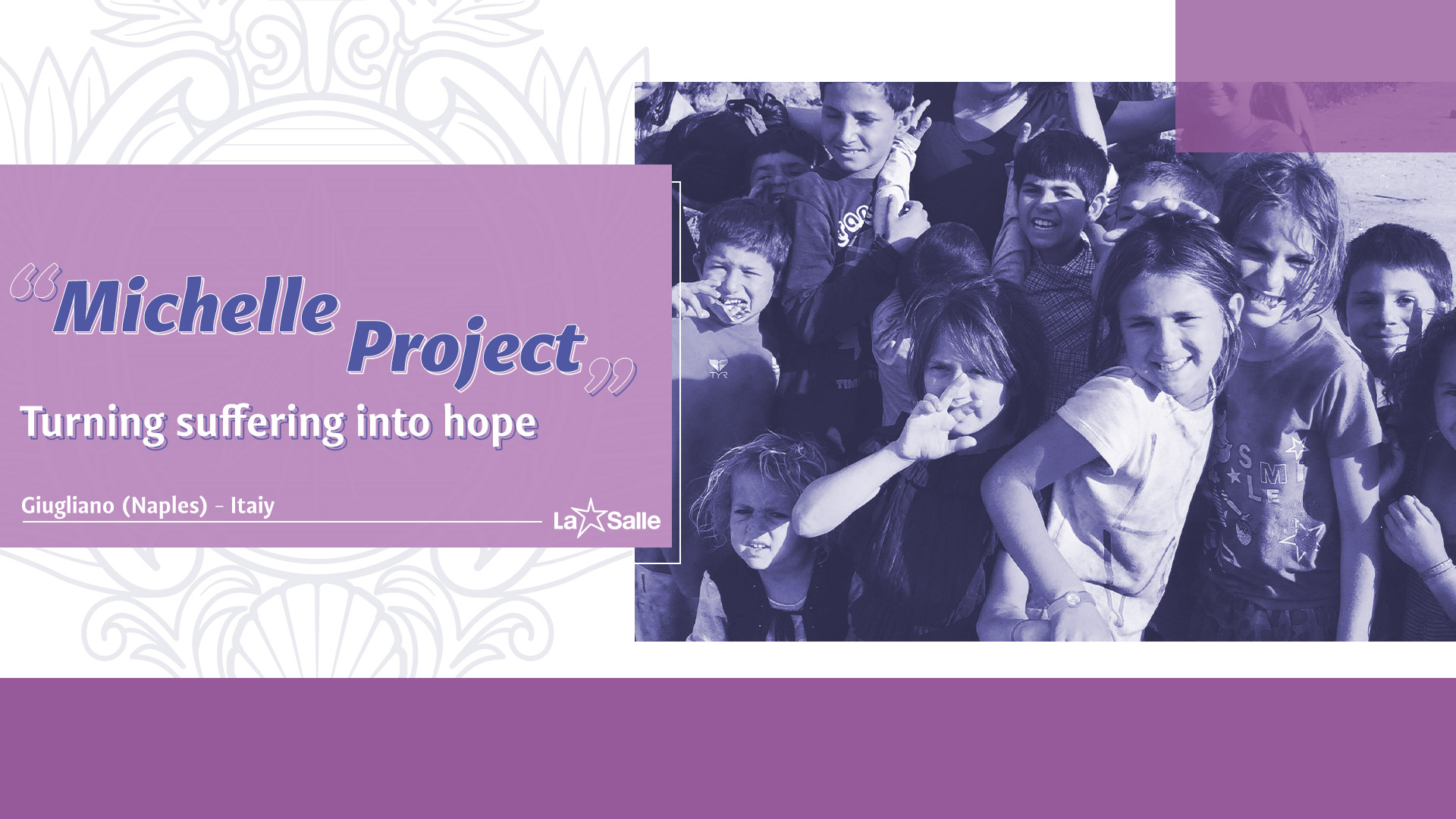Romany camp in Giugliano (Naples). The life of Michelle, a 6-year-old Romany girl, is tragically interrupted by an accident. An uncovered electric wire, which she accidentally touches while playing hide and seek with her little friends, raises a series of profound and urgent questions that affect not only her community, but the entire society.
Michelle longed to go to school, but never managed to due to logistical issues. After a long time and many requests, a transport line was finally set up that went as far as the Romany camp in Giugliano* and would allow her to go to the school she so dreamed of attending. Everything is ready for the girl to start lessons: the school bag with new books, the white gown. She would just have to wait until Monday 15 January.
“The tragic incident of Michelle’s death also deeply disturbed the school community of Collegio San Giuseppe – Istituto de Merode (in Rome). In particular the young people of the ‘Lasallian Youth Movement’ and those who had the service experience at Casarcobaleno in Scampia (Naples), where several high school students have been working with Brothers Enrico Muller and Raffaele Lievore for more than ten years,” Andrea Sicignano, a teacher at Istituto de Merode, tells us.
“The group that was there last June had met Michelle and everyone was deeply shaken by what happened,” he says. “The desire to do something and be useful then became a pressing need for my students”.
“At the same time that we were wondering what to do, somebody from the Community of Saint Egidio, to which both my wife and I have belonged for many years, in charge of the school of peace at Trullo (a neighbourhood in the south of Rome), contacted me shaken by the event to find out how the Brothers of Casarcobaleno in Scampia had reacted to the news”.
“This gave rise to the idea of bringing my ‘de Merode’ students to the premises of the Community of Saint Egidio in Trullo to contribute to the school of peace, which is an after-school programme for foreign and Romany children, all from the Candone camp. It is the largest Romany camp in Rome, where about 700 people live, almost the majority of whom are under 14 years old’.
“We made the proposal among the school’s classes and the response from the students, families, colleagues and also the Brothers went beyond all expectations: within a few days we created a group of 45 students who take turns with each other. It was joined by a group of teachers who accompany them and a group of parents who generously support the costs and needs of the after-school activities. The Brothers immediately agreed to allow us to use the community van to drive the students to their destination”.
“Since mid-January so, a few days after the girl’s death, every Friday, a van with seven students and two teachers (sometimes other teachers go with their own vehicles) leaves from Piazza di Spagna and arrives at the destination around 4 p.m. when the after-school activities start. The children in the centre are helped to do their homework and learn new things’.
The group of Romany children is large (up to 25 at times), often unschooled and made up of very young children, from first or second grade. Around 6pm we have a snack together, with songs and games. Because it is fundamental to teach coexistence and peace. Around 6.30 p.m. the activities end”.
“A whole afternoon, tiring but innovative. The joy of giving surpasses that of receiving and helps both the children of the School of Peace and the students of the Istituto de Merode, who are finally forced to take off the stereotyped masks of often dissatisfied adolescents and rediscover by themselves their beauty, uniqueness, sensitivity and generosity”.
“An afternoon that is leaven in the lives of all those who participate and that makes the school community grow in the concrete awareness that the charism of education towards the poor is truly the right way to change the world, to change everyone’s life and to transform pain into hope,” reflects Andrea Sicignano.
This example of a journey to the peripheries is the result of the Leavening Project that the Institute has been promoting for some time, which has allowed teachers, students and families to really start doing something.
Michelle’s tragedy draws attention to society’s collective responsibility to protect the rights and welfare of children, regardless of their ethnic or social background. Her death must serve as a catalyst for action and change. There is an urgent need to promote policies and interventions that ensure universal access to education, respect for the human rights of all communities and the building of a more inclusive and inclusive society. This requires a collective commitment and structural will to address inequalities and discrimination rooted in the social fabric.
Useful links:
* Thanks also to the new transport line, there are now 55 children attending five public schools in the municipality of Giugliano. In the next few days another 8 minors will be registered and thus the total number of children attending school will be 63.
Text edited by Ilaria Iadeluca (Institute’s Office of Information and Communication). We would like to thank Valerio Lombardo, Head of Animation for the District of Italy as well as Public Relations for La Salle Foundation Italy, and Mr Andrea Sicignano for their valuable collaboration in drafting the article.
Special thanks also go to the Community of Saint Egidio, with whose contribution it all began.



